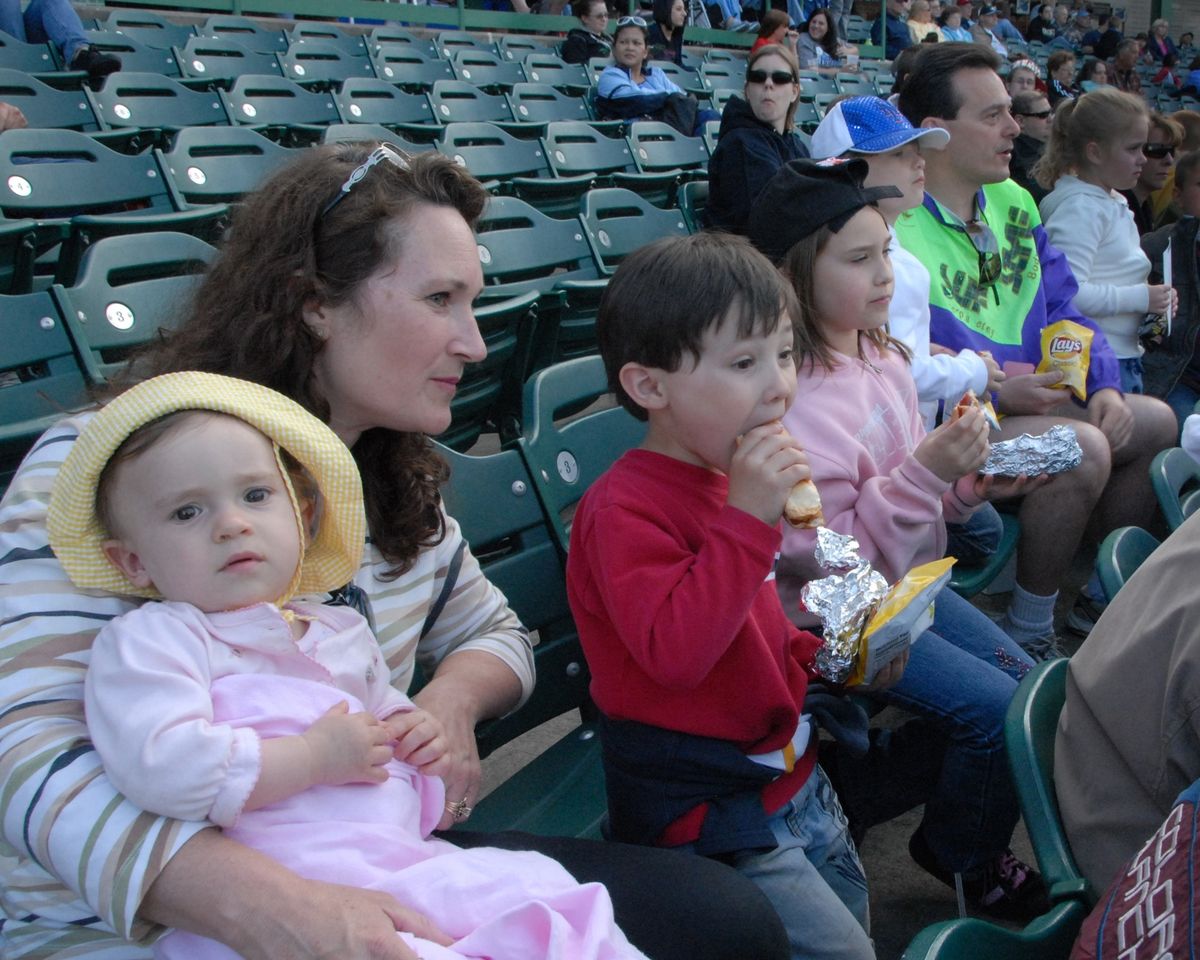Freebies that pay off
Businesses use giveaways to lure customers seeking to offset the recession crunch

LAKEWOOD, N.J. – Some businesses are finding that the best price they can charge is nothing at all.
From minor league baseball teams letting kids eat free to banks making a $100 deposit into new checking accounts, merchants are realizing that giving recession-battered consumers something for nothing can be a good way to get them to buy something else.
The Nardini family of Toms River, N.J. took their four children to a Lakewood BlueClaws minor league baseball game one recent night, drawn by the promise of free food for the kids.
Ellianna, 8; Gianna, 6; Gemi, 4; and Talianna, 1, each walked away from the concession stand with a hot dog, a bag of potato chips and a soda, on the house. That would have set their parents back $21.
The free food was the main reason the Nardinis decided to go to the game.
“It makes it affordable for a large family like ours,” said Albert Nardini, a business consultant. “We’ve become very cost-conscious this year. We’re cutting corners and pinching pennies and being careful how we spend our money.”
The free food benefited the team, too. The Nardinis paid $32 for tickets and parking – in addition to whatever Albert and his wife, Kirsten, spent on food and drinks for themselves, or souvenirs for the kids.
That’s an example of smart, effective marketing, according to Jean-Pierre Dube, a professor of marketing at the University of Chicago’s Booth School of Business.
“You’re essentially giving the person a deal, but not discounting the price of the main product,” he said. “Very often the extra thing is less costly than the discount the firm would have had to make in order to get you to buy the original item.”
It’s not a new phenomenon. But it is being used to great effect during the current recession, he said.
“People tend to have a perception of ‘free’ that exceeds the true value of the product,” he said. “The mere fact that you’re getting something for free makes you happy.”
The BlueClaws, a Philadelphia Phillies farm team, had allowed kids to eat free on Monday nights last year. This year, the deal was extended to every game all season.
And it’s paying off. Geoff Brown, the BlueClaws’ general manager, said the team had sold 20 percent more tickets through its first 17 home games this year than it had last year – something he attributes in large part to the food giveaway.
In Portland, Powell’s Books turned to freebies to drum up more business during its normal afternoon lull in business. In May, anyone who spent $30 at the bookstore between 3 and 6 p.m. got a Powell’s pint glass and a coupon for a $1.25 pint or 25 cent soda at the nearby Bridgeport Brewing Co.
“It’s fun, it’s something different,” said Kim Sutton, corporate marketing manager at Powell’s. “What bookstore do you know that has happy hour?”
Sutton said Powell’s saw a great response although it hasn’t tallied the promotion’s direct impact on traffic or sales yet.
Even opening up a bank account can mean, well, money in the bank. Chase, Citibank and PNC Bank recently ran promotions in which they would deposit up to $100 into a new checking account when customers sign up for direct deposit – an indication to the bank that they’ll be keeping money there for a while.
That’s chump change compared with giveaways by condominium developers in Asheville, N.C., Philadelphia and Jersey City, N.J. They’re offering a free Smart Car with the purchase of units ranging from $550,000 to $2.1 million.
Some businesses have taken free too far and paid the price. Complimentary meals, drinks, hotel rooms and entertainment at many Atlantic City casinos are down this year as the recession forces the gambling halls to pay closer attention to expenses. Total comps fell by nearly 5 percent last year, to about $1.6 billion.
Struggling Resorts Atlantic City gave away $6.3 million in comps in January; last January, it handed out $7.8 million.
Co-owner Nick Ribis told New Jersey casino regulators earlier this year his casino had been giving away “too much food, too much drink, too much everything.”
But others still view those freebies as indispensable marketing tools to lure gamblers.
Free didn’t work out so well for Kentucky Fried Chicken. Or did it? Last month, the fast food chain offered online coupons giving away two pieces of grilled chicken, two side orders and a biscuit.
When Oprah Winfrey promoted the offer on her show, the company was inundated with hungry people. Many stores ran out, prompting the company to suspend the promotion. It instead offered a free meal to those who traded their free chicken coupons for a rain check.
But company President Roger Eaton said the buzz created by the promotion was worth it. Overall sales are up since KFC rolled out its grilled chicken in April, though it won’t say by how much. The company says it’s encouraged by steady sales of the new meal since the launch, indicating customers are coming back to have it again.
“The critical thing for us was to get people to eat the chicken, whatever it took,” he said.